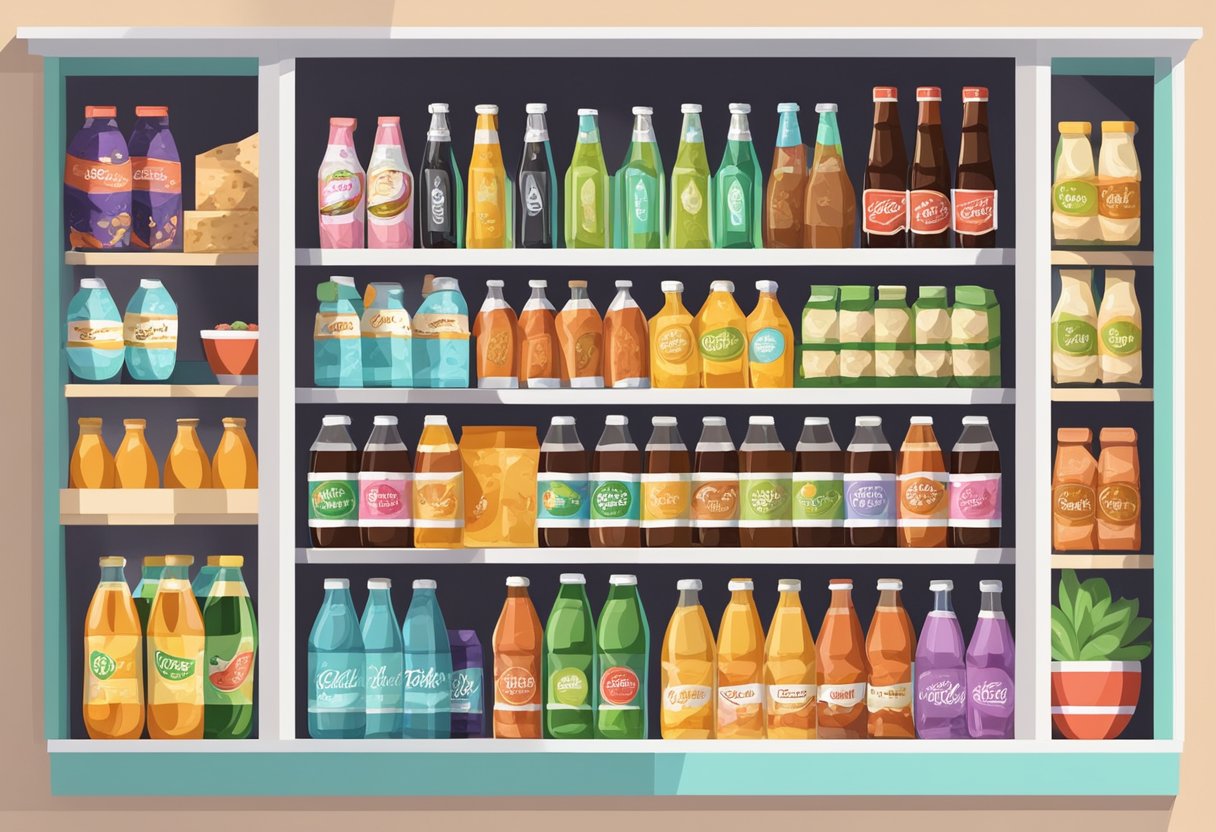Adopting a gluten-free Mediterranean diet offers a balanced approach to eating, emphasizing fresh fruits, vegetables, whole grains, nuts, legumes, and healthy fats, predominantly from olive oil. One of the challenges individuals face when trying to adhere to this lifestyle is determining which beverages are suitable, particularly when it comes to sodas and sugary beverages. While most sodas in North America are considered gluten-free, it is essential for those following a strict gluten-free diet to be vigilant about potential sources of gluten, such as certain caramel colorings used in some imported sodas.

In the context of a gluten-free Mediterranean diet, sugary beverages pose another concern beyond gluten. The traditional Mediterranean diet is low in refined sugars, favoring natural sweeteners and an overall reduction in sugar intake. For individuals looking to enjoy the full health benefits of a gluten-free Mediterranean diet, it is important to limit the consumption of sodas and sugary beverages, which can be high in empty calories and devoid of the diet’s characteristic nutrients.
Key Takeaways
- Most North American sodas are gluten-free, but always verify for hidden gluten sources.
- The Mediterranean diet encourages reducing refined sugar intake, including sugary sodas.
- A strict gluten-free Mediterranean diet requires caution with beverages to maintain health benefits.
Table of Contents
Benefits of a Gluten-Free Mediterranean Diet

The Gluten-Free Mediterranean Diet merges the heart-healthy principles of the traditional Mediterranean diet with the dietary needs of those with celiac disease or gluten sensitivity, focusing on whole foods and avoiding gluten-containing grains.
Understanding Gluten and Celiac Disease
Celiac disease is an autoimmune condition triggered by consuming gluten, a protein found in wheat, barley, and rye. Adherence to a gluten-free diet is critical for individuals with celiac disease as it prevents the inflammatory response that damages the intestinal lining.
Key Components of the Mediterranean Diet
The Mediterranean diet centers on a variety of plant-based foods such as vegetables, fruits, legumes, nuts, seeds, and whole grains, with olive oil as the primary source of healthy fats. Fish and seafood are preferred over red meat, which is limited, along with sweets and processed meat.
Health Benefits and Disease Prevention
This diet model has been linked with reductions in chronic diseases such as heart disease, type 2 diabetes, and certain types of cancer. Its anti-inflammatory effects can lower the risk of chronic inflammation, which is a common thread in many chronic conditions, including metabolic syndrome.
Nutritional Balance and Diet Diversity
The gluten-free Mediterranean diet is high in fiber, vitamins, and minerals due to its emphasis on fruits and vegetables. It is a balanced diet with a variety of macro- and micronutrients, which is considered safe and beneficial for all ages, contributing to healthy aging.
Gluten-Free Mediterranean Diet for Weight Management
The combination of high-fiber plant foods and healthy fats leads to increased satiety, which can help prevent weight gain. It also promotes a lower intake of high-calorie processed foods and saturated fats, making it effective for weight management.
The Role of Physical Activity
The Mediterranean lifestyle also stresses the importance of regular physical activity, which complements the dietary aspect of the diet. Engaging in regular exercise contributes to overall health and works synergistically with diet to prevent cardiovascular disease and assist with weight maintenance.
Daily Meal Planning and Recipes

An integral aspect of a Gluten-Free Mediterranean Diet is variety and balance, ensuring each meal is packed with nutrients, flavor, and complies with gluten-free standards.
Breakfast Options
They start their day with a nutritious gluten-free yogurt parfait, layering Greek yogurt with a mix of berries, a sprinkle of gluten-free granola, and a drizzle of honey. Another breakfast option could be a quinoa oat bowl, combining cooked quinoa and gluten-free oats, topped with sliced almonds, cinnamon, and apple cubes for a hearty start to the day.
Lunch Choices
For lunch, they opt for a quinoa salad with an abundance of veggies, chickpeas, and a simple lemon vinaigrette for a refreshing yet filling meal. Another choice could be a gluten-free wrap filled with grilled vegetables, hummus, and fresh herbs to keep in line with Mediterranean flavors.
Dinner Favorites
Dinner favorites often include baked or grilled fish seasoned with herbs, served alongside roasted vegetables. They also enjoy a dish of lentils or other legumes, paired with a side of gluten-free grains, like millet or buckwheat, ensuring a diverse, protein-rich evening meal.
Snacks and Light Meals
For snacks and lighter meals throughout the day, they turn to small portions of nuts, slices of fruits, or veggies dipped in gluten-free hummus. A gluten-free diet allows for creativity, such as rice cakes with avocado or small servings of mixed olives, cheeses, and gluten-free crackers.
Navigating Gluten-Free Products

When selecting products for a gluten-free Mediterranean diet, it’s essential to understand how to identify safe gluten-free beverages, choose appropriate grains and alternatives, and be diligent about reading labels to avoid gluten additives.
Identifying Safe Gluten-Free Beverages
Many popular sodas and sugary beverages are considered safe for individuals with gluten sensitivity. Brands like Coca-Cola, Pepsi, and Dr. Pepper offer options that are typically gluten-free and safe for those with celiac disease. However, caution is advised when opting for less common or boutique brands, particularly energy drinks, which might include gluten-containing ingredients or additives. When considering healthy drink options, beverages like nut milk can also be integrated into the diet, as they provide both nutrition and variety.
- Safe gluten-free sodas: Classic colas, ginger ales, lemon-lime sodas
- Potential risk beverages: Root beers, boutique energy drinks
- Nut milk options: Almond, cashew, and coconut milk
Choosing Gluten-Free Grains and Alternatives
Incorporating whole grains and gluten-free alternatives is a cornerstone of the Mediterranean diet. Staples include corn, rice, buckwheat, oat (certified gluten-free), chia, quinoa, and millet. Each offers unique health benefits and can be used in a variety of dishes—from breakfast cereals to dinner sides. Opting for brown rice over white adds additional nutrients and fiber, aligning with the diet’s emphasis on whole, unprocessed foods.
- Grains to enjoy: Quinoa, millet, buckwheat
- Considerations: Only choose oat products that are labeled as certified gluten-free
Reading Labels and Avoiding Gluten Additives
One cannot stress enough the importance of scrutinizing product labels for gluten-containing grains, additives, colors, and flavors that may not be gluten-free. Be vigilant about products labeled gluten-free, and when in doubt, seek guidance from a registered dietitian. Legitimate gluten-free products should be clearly marked as such, and many will also carry a certification from a recognized gluten-free organization.
- Check for certification: Look for seals from gluten-free certifying agencies
- Hidden gluten: Watch out for additives that may contain gluten
- Consult professionals: When in doubt, a registered dietitian can provide valuable insight
Incorporating Gluten-Free Mediterranean Ingredients

Integrating gluten-free options within the Mediterranean diet focuses on utilizing a variety of whole foods that are naturally free of gluten. These staples contribute to a balanced diet rich in nutrients.
Vegetables and Fruits in the Diet
Vegetables and fruits form the foundation of the gluten-free Mediterranean diet. Incorporating a variety of colorful produce such as tomatoes, cucumbers, broccoli, and sweet potatoes provides essential vitamins and antioxidants. Olives are another key component, often served as a snack or added to salads.
- Tomatoes: Rich in lycopene, great for heart health
- Cucumbers: High water content for hydration
- Broccoli: Packed with fiber and vitamin C
- Sweet Potatoes: A good source of vitamin A and potassium
Sourcing Healthy Proteins
Proteins in the gluten-free Mediterranean diet primarily come from seafood and poultry. Choices like salmon, rich in omega-3 fatty acids, and shrimp offer significant health benefits. It is also important to include legumes, such as chickpeas, which can be used in dishes like hummus or salads.
- Fish: Choose varieties like salmon for omega-3s
- Poultry: A lean protein source
- Chickpeas: Fiber-rich and can support digestive health
Including Dairy and Cheese Varieties
Dairy products provide calcium and protein. Options include Greek yogurt and a variety of cheeses such as feta, which are integral to the diet but should be consumed in moderation due to fat content. When opting for cheese, choosing varieties that are lower in lactose and fat can be beneficial.
- Greek Yogurt: Contains probiotics for gut health
- Feta Cheese: Adds flavor to salads and dishes
Using Oils, Nuts, and Seeds
A staple of the gluten-free Mediterranean diet is the use of high-quality olive oil for cooking and dressings. Additionally, incorporating nuts and seeds like chia provides healthy fats, fiber, and protein.
- Olive Oil: The principal source of fat in the diet
- Chia Seeds: Can be added to yogurt or salads for a nutrient boost
Adapting to the Gluten-Free Mediterranean Lifestyle

Adopting a gluten-free Mediterranean diet necessitates thoughtful changes in dietary habits and food choices to support both social well-being and long-term health.
Impact on Daily Life and Social Interactions
One embarks on significant lifestyle changes when transitioning to a gluten-free Mediterranean diet. Social settings, notably in regions like Europe or Italy where cuisine is culturally ingrained, may require careful navigation. Individuals must communicate their dietary needs, often choosing restaurants that cater to a gluten-free diet or selecting healthy fats and anti-inflammatory foods at social gatherings.
Typical social interactions might change to include:
- Engaging with hosts about menu options before attending a dinner
- Sharing gluten-free Mediterranean snacks to introduce new foods to friends
- Educating peers on the benefits and reasons for a gluten-free diet
Long-Term Health and Sustainable Eating Habits
Integrating a gluten-free Mediterranean diet is a strategy not just for those with celiac disease, but also for people aiming to prevent chronic disease and promote overall well-being. Sustainable eating habits include a diverse intake of plant-based foods and the use of healthy fats like olive oil, while excluding processed sweets and meats.
Sustainable habits include:
- Preparing meals with a variety of vegetables, fruits, and legumes
- Consuming seafood and poultry in moderation
- Prioritizing whole, unprocessed foods
Consultation with Health Professionals
When undertaking a gluten-free Mediterranean lifestyle, working with health professionals such as a registered dietitian is crucial. These experts provide guidance on adhering to the diet safely, ensuring nutritional needs are met, and offering strategies for maintenance post-diagnosis.
Key professional consultations may involve:
- Determining how to balance macronutrients and micronutrients
- Identifying hidden sources of gluten to avoid potential contamination
- Customizing meal plans that align with the individual’s health needs, as recommended by organizations such as the Celiac Disease Foundation
Understanding Consumptions and Risks

When adopting a gluten-free Mediterranean diet, it is crucial to be mindful of sugary drinks and sodas, understanding their effects on health, and managing their intake. This approach not only supports weight management but also aligns with the diet’s emphasis on whole foods.
The Effects of Sodas and Sugary Drinks
The consumption of sodas and sugary beverages is associated with weight gain and a variety of health issues. Researchers have found that drinking one to two sugary beverages per day can increase the risk of type 2 diabetes significantly. These drinks often contain high levels of additives and sugars, which are not recommended for those following a gluten-free Mediterranean diet. The diet prioritizes gluten-free products and whole foods over processed items, like sodas, that may contain gluten-containing grains such as whole wheat, rye, or barley.
Managing Daily Sugar and Gluten Intake
Individuals on this diet should be vigilant in their daily sugar and gluten intake to maintain optimal health. Processed sugary drinks are not only high in calories but may also contain hidden gluten-derived additives. These additives can pose a risk for those who are gluten-sensitive. Monitoring the intake of sweets and choosing gluten-free options are essential steps. Gluten-free does not inherently mean healthy, so it is important to choose beverages that are both free from gluten and low in added sugars.
Avoiding Common Pitfalls
While adopting a gluten-free Mediterranean diet, individuals often encounter pitfalls related to beverage choices. One common mistake is replacing sugary sodas with seemingly healthy sports and energy drinks that also contain sugars and gluten-derived ingredients. Keeping a list of safe-to-consume beverages, such as water, herbal teas without added sugars, and freshly squeezed juices in moderation, can help avoid such pitfalls. It is also important to read labels carefully to ensure that gluten-free products do not contain high amounts of added sugars or syrups.
Emerging Trends and Research

The landscape of dietary options continues to evolve, particularly within gluten-free alternatives and the overarching health benefits of the Mediterranean diet. This section explores these innovations, as well as the latest findings in the management of celiac disease.
Innovations in Gluten-Free Foods
Gluten-free products have seen significant advancements, aimed at improving taste, texture, and nutritional value. Companies are increasingly utilizing ancient grains like quinoa and amaranth to enhance the protein content in gluten-free recipes. Additionally, novel baking techniques and ingredients are being developed to mimic the qualities of gluten in breads and pastas, providing a wider variety of gluten-free diet options for consumers.
Updates on the Mediterranean Diet and Health
Recent studies reinforce the Mediterranean diet as an anti-inflammatory diet, highlighting its role in reducing the risk of chronic diseases. The diet’s emphasis on whole grains, fresh produce, and healthy fats aligns with the recommendations of many registered dietitians for maintaining optimal health. Additionally, incorporating gluten-free alternatives into this diet has become easier, as more gluten-free products that fit within the dietary pattern become available.
Developments in Celiac Disease Treatment and Diagnosis
The Celiac Disease Foundation reports advancements in both the diagnosis and treatment of celiac disease. New non-invasive diagnostic tools are being researched, reducing the need for traditional endoscopy procedures. On the treatment front, novel therapies are in clinical trials, aiming to lessen gluten’s effects on the body or to modify the immune response, giving hope to those on a strict gluten-free diet for managing their condition.
Frequently Asked Questions

Navigating the complexities of a gluten-free Mediterranean diet can be challenging, especially when it concerns beverages. Below are some of the common questions people have about sodas and sweet drinks in relation to this dietary framework.
What are suitable soda or sweet drink alternatives while following a gluten-free Mediterranean diet?
Individuals can explore a variety of carbonated mineral waters flavored with natural fruit juices as alternatives to traditional sodas. The use of fresh fruit infusions also offers a refreshing twist without compromising gluten-free or Mediterranean diet guidelines.
Are there gluten-free beverage options that align with Mediterranean diet principles?
Yes, there are gluten-free sodas available that fit within the Mediterranean diet’s principles, particularly those that are free from artificial additives and preservatives.
How can one satisfy sweet cravings on a gluten-free Mediterranean diet without resorting to sugary sodas?
Sweet cravings can be addressed with naturally sweet beverages such as homemade smoothies using fresh fruits. Herbal teas sweetened with a bit of honey are another suitable option that adheres to a gluten-free Mediterranean diet.
What guidelines should be followed for liquid intake in a gluten-free Mediterranean diet?
Liquid consumption should primarily focus on water, with allowances for moderate intake of wine, particularly red wine, for its heart-healthy benefits. Sugary sodas should be limited to maintain the balance of the diet.
Can natural fruit juices be included as part of a gluten-free Mediterranean diet, and in what quantities?
Natural fruit juices, without added sugars, can be part of the diet in moderation. They are a good source of vitamins but should be consumed in careful quantities due to their high natural sugar content.
What are the restrictions on sweetened beverages in the traditional Mediterranean diet, considering gluten intolerance?
The traditional Mediterranean diet restricts the intake of sweetened beverages to preserve its health benefits. Individuals with gluten intolerance should be mindful of the ingredients in sweetened drinks to ensure they do not contain gluten-containing additives.



